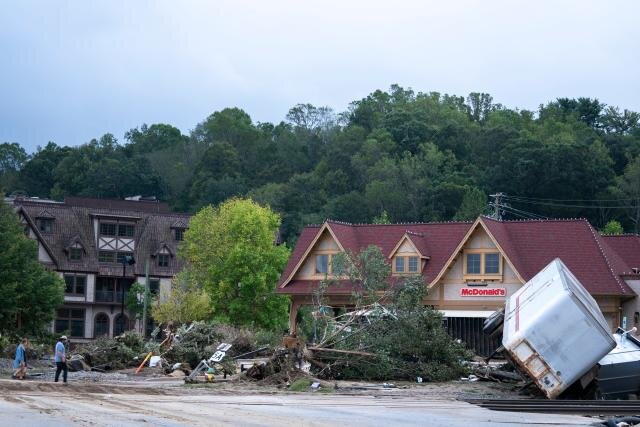Introduction
Hurricane Helene made landfall as a Category 4 and wreaked havoc across the southeastern US, especially Asheville and Western North Carolina. Region-wide storm damage was extensive due to flooding, strong winds and heavy rain. Many Asheville residents are dealing with the burden of storm damage repair and recovery as their daily lives are disrupted by power outages, road closures and downed power lines.
We’ll look at tens of thousands of ways to fix storm damage in Asheville and Buncombe County in this guide after Hurricane Helene. It’s important for affected communities to know what to do, from understanding insurance claims to getting government aid.

This home selling guide is prepared by professional home buyers from Cardinal House Buyers
1. Assess the Immediate Storm Damage: Prioritize Safety
Safety first after Hurricane Helene. Buncombe County is dangerous right now with high winds and flood waters. Some areas are impassable due to downed trees, power lines, debris and standing water. Especially in areas hit hard like Biltmore Village and the River Arts District, residents should stay away from flooded areas and watch for road closures. As rescue operations and emergency teams are on the ground, public safety is top priority.
If your home was affected, be careful when you enter. There’s a chance of electrocution in flooded areas and there may be structural damage. For advice on making your property safe, contact FEMA or your local fire department. Although Asheville’s fire department is working with swift water rescue teams to help homeowners in flooded areas, caution is still advised.

2. Document the Damage and File Insurance Claims
Once you’ve determined your property was damaged by the storm, document everything. Take pictures and videos of fallen trees, flood damage and any structural issues caused by strong winds or heavy rain throughout. You’ll need these for your insurance claim.
Working with Your Insurance Company
Many in Asheville are wondering if flood and storm damage repair or storm damage restoration is covered by their insurance. In North Carolina, leaks from storm damaged roofs and wind driven rain are covered by homeowners insurance. But flooding from overflowing rivers requires a separate flood insurance. Contact your insurance company as soon as possible if you’re filing a claim. An adjuster will need to come out to your property to assess the damage and determine how much your policy will cover. Be prepared to discuss specific expenses like structure damage, mold removal from flooding and roof repairs.
Residents without flood insurance may be eligible for federal aid. President Joe Biden has authorized FEMA to send disaster aid to Hurricane Helene affected areas since it’s been declared a catastrophic storm. The cost of repairs and temporary housing may be covered by this aid.
3. Federal Assistance and Relief Efforts in Western North Carolina
Federal and state relief efforts are underway in response to the massive storm damage in Western North Carolina. Governor Roy Cooper and FEMA have organized emergency response teams to help Asheville, Buncombe County and other affected communities. Residents can ask for federal aid to pay for repairs, temporary housing and other necessities. Businesses and homeowners can also apply for low interest disaster loans from the Small Business Administration (SBA).
Emergency Resources:
Water and emergency food supplies are among the resources the North Carolina Department of Public Safety is working to get to the affected areas. The National Weather Service (NWS) is monitoring the weather to alert locals to any storm or flash flooding damage.
Federal funds for North Carolina, specifically for relief efforts after Hurricane Helene landfall, have been released by the White House. There are local relief and rescue efforts in addition to federal aid. Asheville residents without power and water are getting food and essential supplies like water from many churches and community organizations. In some areas, it may take weeks to get utilities restored.
4. Flood Damage and Water Removal
Flood damage has been one of the most common and costly effects of Hurricane Helene. Many homes have been damaged by heavy rain and flash flooding leaving homeowners with the task of drying out and repairing their properties. According to the North Carolina Department, Asheville received record breaking rainfall during the storm which made the flooding worse.
How to Handle Water Damage:
Remove Standing Water: Use wet vacuums and pumps to get rid of any standing water in your home. If the damage is severe, consider hiring water damage restoration services.
Ventilation and Drying: Open the windows and use fans to help your home dry out. Dehumidifiers are great tools to remove excess moisture from the air.
Mold Prevention: After floods, mold can start to grow in 24 to 48 hours. To prevent further damage, dry out items like drywall and carpets. If there’s significant damage, mold remediation services may be required. Long term recovery efforts are underway in flooded areas of Western North Carolina including parts of Henderson County, Old Fort and Black Mountain. In some areas, swift water rescues have been done but many roads are still closed due to debris and flooding.
5. Storm Damage Repair: Roofs, Power and Structural Issues
Helene brought significant roof damage from wind and flying debris in addition to water damage. Now many homeowners have to replace or repair parts of their roofs due to further damage from leaks in the roof.
Common Repairs After Hurricane Helene Landfall in North Carolina:
Roof Repairs: The cost to fix a leaky roof can range from $500 to $3,000 depending on the extent of the damage. To prevent further water damage, it’s crucial to address roof issues ASAP.
Structural Repairs: Homes’ structures can be weakened by strong winds and heavy rain. Make sure a qualified inspector checks your home to look for hidden problems.
Electrical Repairs: Many homes are without power due to outages and downed power lines. Before turning the power back on, fix any damage to your electrical system with a licensed electrician.
The storm also affected the Asheville Regional Airport which caused flight delays and other forms of transportation. Authorities in the area are working to clear debris from runways and surrounding roads and restore services.
6. Protecting Yourself from Price Gouging and Scams
Asheville residents should be on the lookout for price gouging while these communities recover. Some businesses may raise the price of necessities like gas, bottled water and storm damage repairs after a disaster. The North Carolina Department of Justice is investigating reports of price gouging in flooded areas and encourages locals to report any suspicious activity.
Also be wary of unlicensed workers who offer storm damage quick fixes. Before hiring a contractor to do repairs, make sure they are insured and licensed.
7. Lessons Learned and Preparing for Future Hurricanes
Asheville and Western North Carolina are gearing up for the next storm season as Helene leaves her mark on the area. Although Helene was brutal, homeowners can take steps to keep their properties safe in the future.
How to Prepare for Future Storms:
Flood Insurance: If you live in a flood prone area, consider getting flood insurance to protect your home from flood damage.
Roof Maintenance: Check your roof for leaks and loose shingles. Take care of any necessary repairs before hurricane season starts.
Emergency Supplies: Keep bottled water, nonperishable food, flashlights, first aid supplies and other essentials on hand.
Evacuation Plans: Prepare an escape plan for upcoming hurricanes. Keep a backpack with essentials and know the best routes to higher ground.
Conclusion: Recovery and Rebuilding in Asheville
Asheville and Western North Carolina has a long way to go to recover from the catastrophic damage from Hurricane Helene. The hurricane has left homeowners with devastating damage from downed power lines to floodwaters but with help from the federal government, insurance companies and their neighbors they can start the recovery process. Stay aware and stay alert as residents focus on storm damage repairs and relief efforts continue.
You can speed up the recovery for your home and community in Western North Carolina by taking action now, whether that means calling your insurance company for a claim, applying for federal assistance or fortifying your property against further damage.


But it gets better:
You can sell fast without an agent with no rush to move. You don’t have to move out right away; you can stay in your home for awhile until you locate another home.
We are confident that we can help you today – regardless of the situation.

